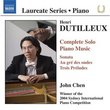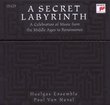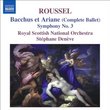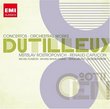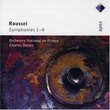| All Artists: Albert Roussel, Jet Roling, Irene Maessen Title: Albert Roussel: Complete Chamber Music Members Wishing: 1 Total Copies: 0 Label: Brilliant Classics Original Release Date: 1/1/2008 Re-Release Date: 1/8/2008 Genres: Pop, Classical Styles: Vocal Pop, Chamber Music, Forms & Genres, Sonatas, Historical Periods, Classical (c.1770-1830), Instruments, Reeds & Winds, Strings Number of Discs: 3 SwapaCD Credits: 3 UPC: 842977084139 |
Search - Albert Roussel, Jet Roling, Irene Maessen :: Albert Roussel: Complete Chamber Music
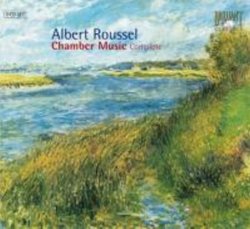 | Albert Roussel, Jet Roling, Irene Maessen Albert Roussel: Complete Chamber Music Genres: Pop, Classical
|
Larger Image |
CD DetailsSimilar CDs |
CD ReviewsLike French vermouth--bracing, complex and intoxicating Dace Gisclard | Houston, TX | 08/18/2008 (5 out of 5 stars) "Not QUITE all of Roussel's chamber music is in this handy collection (more of that later), but thanks to Brilliant for making it available again at such a bargain price. (These discs were originally released in 1994 on OLYMPIA [DDD]). Roussel wrote chamber music throughout his life, so his stylistic development can be followed on these discs. Opera 2, 6, and 11 are early works influenced by Debussy, Ravel D'Indy and Franck. Nevertheless, they are well-wrought, have an individual stamp, and are not just juvenilia. In the Poemes de Ronsard, Op.26, a sinewy, dissonant and motoric Stravinskian influence begins to assert itself. However, there remain a harmonic sensuousness and a Ravel-like lyricism that never deserted Roussel. All of Roussel's mature works are permeated with contrapuntal interest, and possess textural clarity, formal integrity and concision, and high technical finish in the instrumental writing. In 1924, Roussel described the then current trends in neo-classicism--his remarks read as a self-portrait: "...the return to cleaner lines, more emphatic accents, more precise rhythm, a style more horizontal than vertical, a certain brutality sometimes in the means of expression, contrasting with the subtle elegance and the misty atmosphere of the preceding period, an attentive and sympathetic glance toward the robust frankness of Bach or Handel, in short...a return to the classic tradition..." Although open to all musical currents of his era, Roussel was not a barometer of stylistic fads, nor a satellite of his contemporaries, and, despite great harmonic sophistication, remained a tonal composer. Again, Roussel's own description of his response to outside influences is as concise and direct as his compositional style: "The work of a great artist should be an example and not a model...a lesson valid only by the suggestions that it awakens in an independent mind." Among the highlights herein are, of course, the relatively well-known String Quartet (one of the best of the 20th century), "Joueurs de flute" which has become a standard teaching piece, the Serenade for Flute, String Trio and Harp, and the String Trio, one of Roussel's greatest works. This set ISN'T complete, but there doesn't seem to be a great deal missing. Toke Lund Christiansen's set of the complete music for flute included "Le Marchand de sable qui passe," which is a 20-minute suite of incidental music for flute, clarinet, horn, strings and harp. On the other hand, Brilliant scores over Christiansen by including the brief fourth movement of "Elpenor." There's a bit of confusion surrounding the piece titled "Pipe," played here on the piccolo. Christiansen and Brilliant both include a piece with this title, but Christiansen's is over three minutes long, whereas Brilliant's is only 57 seconds! The similarities in the solo parts are apparent, but the piano accompaniments are radically different. Perhaps an expert in flute literature would be so kind as to enlighten me as to what is actually on offer here. Could the piece in Christiansen be "Aria No.1?"--both sets include "Aria No.2," but neither has "Aria No.1." I especially like the packaging--a sturdy cardboard folder that first opens to reveal a printout of the contents, and then opens fully to allow access to all the discs at once, held firmly on plastic hubs, with the booklet neatly tucked away in a slot at the side. All of the performers are Dutch, and all of them good. The sound is generally excellent, and, according to the notes, all recorded in the same venue. Despite this, I found the works involving the eponymous Schonberg Quartet too closely miked and a bit shrill--the treble control handles this nicely. This is an indispensable purchase for admirers of this composer and highly recommended to lovers of Stravinsky, Ibert, Ravel, and Gallic neo-classicism." An important release G.D. | Norway | 04/18/2009 (4 out of 5 stars) "This important release brings the chamber works of Albert Roussel, previously released on the Olympia label, back into the catalogue. There is indeed much to savour here musically, and the performances are overall more compelling than the ones on the label's release of the complete chamber music of Jacques Ibert. The works are ordered chronologically, thus displaying the intriguing development of Roussel's style from the early works (though Roussel was already in his thirties when writing them) inspired by d'Indy and Franck to the highly original, personal take neo-classicism in the later music.
The first disc covers works written between 1902 and 1908. The piano trio op. 2 is a fine work, but slightly dry, predictable and academic and somewhat overlong - and not at all sounding like the later Roussel. The first violin sonata exhibits the same characteristics, and although again being a fine work, is not a work I would return to very often. The performances of both works are good enough, if not particularly distinguished. The Divertissement for piano and wind quintet is more interesting, and displays a more individual voice, with some quirky harmonies, interesting rhythms and surprisingly effective contrasts between reflective and more exuberant materials. And in this work the performers seem really to enjoy themselves, providing a committed and spirited account. For the second disc we take a leap to 1919 (during the years between the works on the first and second discs Roussel focused primarily on orchestral music). The impromptu for harp is stylisitically reminiscent of his opera Padmâvatî and is an enchantingly mesmerizing little gem. The two Ronsard settings are delightful and interesting, but they are overshadowed by the quite magical Joueurs de flute, a four-movemented work of diverse and haunting musical material, skillfully developed throughout. It is also exquisitely performed by Verhey and Röling - competition is available, but the performances on this disc have no problem standing their ground. The second violin sonata is a fine work as well, with a shadowy, insistently dramatic first movement, a lyrically beautiful but somewhat austere andante and a terse, dry almost sarcastic-sounding presto. This one also receives a committed and songful performance by Kantorow and Röling. The Serenade for flute, string trio and harp is a near-masterpiece, full of strange and magically swirling colors, with a chattering diverting first movement, a lush, almost otherworldly second movement and an energetic, almost provocatively sensual last movement. The performances are somewhat tentative, but overall manage to do the work justice. The remaining music on this disc is of less musical interest; Segovia is charming but slight (and the sound quality here doesn't benefit an already rather flat-footed performance). Even Roussel is unable to make the duo for double bass and bassoon amount to very much apart from some dry humor. The Aria no. 2 (an arrangement of a Vocalise for voice and piano) is agreeable but slight. The third disc encompasses works written between 1929 and 1937, and gives us some music which is, frankly, less musically rewarding overall. The Pipe for piccolo and piano is very slight, the Elpénor suite a dull and directionless work and the Andante and Scherzo for flute and piano sounds awkward and meandering - and I don't think the performers are to blame. The andante from the uncompleted wind trio might be of biographical interest but nothing more. The string quartet, however, is another matter, with a witty, extremely well-crafted and engaging first movement, a profound second movement, an economically wrought but exceptionally satisfying scherzo and a rather terse, but impressive fugal finale. The performances are also good, dynamic and well-balanced. The trio for flute, viola and cello is not on the same level, but still presents us with some fine examples of impressively elegant neo-classicism; somewhat austere and tightly argued. The string trio (Roussel's very last work) is a serious, rather dark and poignant work; the allegro first movement is purged of anything resembling Roussel's usual wit, the (rather beautiful) andante sounds resigned and the last two movements hauntingly grotesque rather than elegant and jolly. It is, in short, a harrowing and powerfully impressive work, and it is given another fine performance here. To sum up, then, this is a very attractive set, especially at the price. Not all the works here are masterpieces, but many of them are extremely rewarding. And the performances, though somewhat variable, are generally of high quality. Sound quality is also usually far more than serviceable; though not ideally clear in all the works. This set does anyway deserve a thorough recommendation." |

 Track Listings (7) - Disc #1
Track Listings (7) - Disc #1